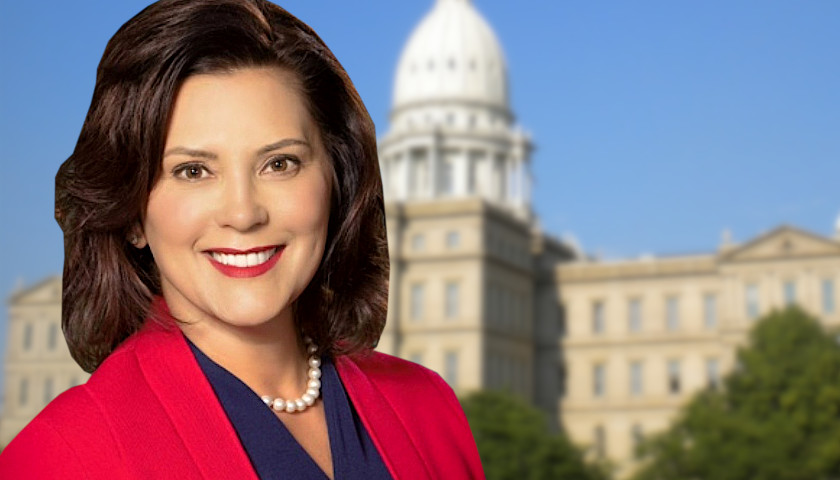by Scott McClallen
Michigan Gov. Gretchen Whitmer says Michigan needs to find an extra $2.5 billion to help fix the state’s roads as she reaches an impasse with Republican leaders on the 2020 budget.
Critics say the state already receives and spends enough tax dollars.
HB 4481 and 4482 would amend Michigan’s constitution to create a graduated income tax, under which those who earn more would pay a higher tax rate. The estimated annual revenue boost is $2.5 billion.
Whitmer also has proposed a 45-cent-per-gallon increase in Michigan’s fuel tax.
“I’ve heard from people all across Michigan and this budget reflects the priorities they have shared,” Whitmer said in a statement. “People are tired of driving on crumbling and unsafe roads and bridges, they want to turn on their tap and know that the water is clean and safe, and they want a strong educational system that leads to opportunity and a good job.”
An April poll by Marketing Resource Group found that 75 percent of Michigan voters – and even a majority of Democrats – opposed the gas tax hike proposal.
If Whitmer and Republican leaders don’t reach a deal on gas tax increases, Michigan voters could be asked to approve a graduated income tax as early as the November 2020 election.
“It’s my understanding that there are some that are working on that kind of a proposal,” Whitmer told the Free Press in Flint this week.”That’s something that certainly I’ve supported in the past and something that I would take a close look at.”
Two bills show how a Michigan graduated income tax system might be structured. Rather than the state’s current flat tax rate of 4.25 percent, the bills seek to:
• Impose a 4 percent rate on the first $5,000 of taxable income, a 4.25 percent rate on taxable income between $5,000 and $75,000, and an 8.4 percent rate on taxable income above $75,000.
• Set a $5,000 personal exemption, up from $4,050 currently, but reduce that exemption for filers with taxable income over $80,000 (or joint filers with income over $160,000)
• Eliminate the exemption for filers with taxable income above $100,000 (or joint filers above $200,000).
Backers would need about 425,000 valid signatures by July 6, 2020, to get the measure on the ballot.
State Rep. Robert Wittenberg, D-Huntington Woods, sponsored the income tax legislation.
The bills seeks to raise an extra $2.5 billion in the first full year of implementation, and 92 percent of Michigan filers would either get a tax cut or have their taxes stay the same under the plan, according to Wittenberg.
The roughly 400,000 filers receiving a tax increase – single filers with taxable incomes above $75,300 and joint filers with taxable incomes above $150,600 – would receive tax increases averaging about $6,250 a year. Though that would be the average increase, to get an increase as high as $6,250, a married couple filing jointly would need to have taxable income of at least $300,000.
A poll conducted by TargetSmart for the State Innovative Exchange found that 76 percent of respondents supported a graduated income tax under which “millionaires pay more and working people get a tax cut.”
Michigan residents rejected the graduated income tax in 1968, 1972, and 1976 by percentages of 77-23, 69-31, and 72-28, respectively.
Michigan Republicans said they oppose the change because it would result in a net tax increase of $2.5 billion.
State Rep. Lynn Afendoulis, R-Grand Rapids Township, chairwoman of the House Tax Policy Committee, said a graduated income tax “doesn’t seem like it’s a very innovative solution.”
The proposed 45-cent gas tax increase would increase gross revenues by $2.5 billion and road revenues by $1.9 billion, with $600 million in general fund money for other priorities.
A $2.5 billion revenue boost from a graduated income tax would allocate 22.7 percent of net revenues to the School Aid Fund, according to the bill. It would allow Whitmer and lawmakers to remove the sales tax off of gasoline and replace it with fuel taxes.
James Hohman, The Mackinac Center for Public Policy’s director of fiscal policy, told The Center Square that state road funding already is at record levels, having doubled from $2 billion from 2000-2010 to over $4 billion last year.
“There’s plenty of money in the state budget,” Hohman said. “Our road revenues are growing, and if road funding is a priority, it should be a priority for the growing revenue the state is collecting.”
The gas tax increase would take about $599 annually from the average Michigan household that has two cars that each burn about 666 gallons of gas.
– – –
Scott McClallen is a staff writer covering Michigan and Minnesota for The Center Square.






Get the rope ready and start building the platforms…
Taxation is theft and taxed enough already and I can’t afford to live as it is now